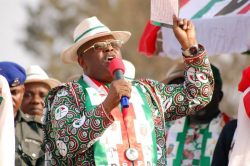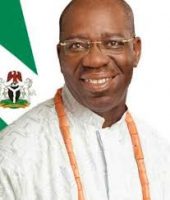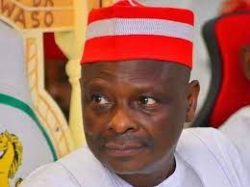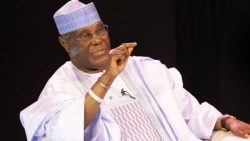Featured
Self-interest heralds gale of governors’ defection in Nigeria
Published
5 years agoon
By
Olu Emmanuel
Between June 2020 and June 2021, four governors have changed the political parties that brought them to power in general elections for reasons that are at variance with constitutional provisions on defection. These are in addition to the number of lawmakers that have defected from their parties to the others within the period under review.
There are indicators that the emergent gale of defection, especially, by governors, is rapidly exposing the absence of identifiable ideological faultlines differentiating one political party from the other, including the inherent fragility of democracy and the rule of law in Nigeria.
While the constitution prescribes that all elections in Nigeria are contested by political parties which sponsor candidates, governors defect, and sometimes counter-defect, from the party that brought them to office to the party that lost the election with the electoral victory of the initial party. The constitution acknowledges that defection can only take place when there are internal conflicts within a party.
The opposition Peoples Democratic Party (PDP) had in the past six months lost three sitting governors to the ruling All Progressives Congress (APC) in succession. What the APC lost at the polls during the elections, the party gained through defections, essentially in the southeast and south-south. APC, however, lost one governor to the PDP in 2020.
The PDP governors that have defected to APC in the current government include Governor Dave Umahi of Ebonyi State; Governor Ben Ayadi of Cross River State; and Governor Bello Matawalle of Zamfara State in northwest Nigeria. APC is apparently deepening its roots in the south through defections rather than through winning elections, with the exception of Imo State where Governor Hope Uzodinma emerged through the Supreme Court.
Governor Bello Matawalle of Zamfara State, who won the 2019 governorship election through the Supreme Court on the platform of the PDP, on Tuesday, June 29, 2021 defected to the APC without noticeable conflicts in the PDP.
The Personal Assistant on Digital and New Media to President Muhammadu Buhari, Bashir Ahmad, on Sunday morning, leaked the defection of the Zamfara governor to the APC.
“So, Zamfara is back home! Welcome Matawalle,” Ahmad had celebrated.
Matawalle had dissolved the Zamfara State Executive Council on June 12 towards his defection to the APC.
The governor had dissolved the cabinet to eliminate PDP Commissioners and others who declined to defect to APC with him. However, Matawalle said he dissolved the cabinet to reengineer the state government for the second half of his tenure, denying any intention to decamp to APC.
The Zamfara governor has been noticed not to be participating actively in the meetings of PDP Governors in recent times.
The media manager of the governor, Yusuf Idris, had also on Sunday disclosed that Governor Matawalle will decamp to APC with “the national and state assembly members as well as the PDP executives from all levels of the state.” He declared: “… Zamfara politicians have always been a single family and even as a PDP governor, my principal has always related very well with those in the opposition parties.
“Many people from high and low have followed the governor into the PDP in order to offer their positive advice for the growth and development of the state; some of such persons were given top government positions and responsibilities which they held very well too.
“Under this new development of joining the APC, which will be witnessed by 18 APC governors, the governor will come along with all the national and state assembly members as well as the PDP executives from all levels of the state.”
State government officials were on Sunday directed to commence dismantling PDP flags at Government House in preparation for the defection to APC.
Governor Dave Umahi of Ebonyi State had in November 2020 defected from the PDP to APC, protesting that the PDP was not willing to zone the 2023 presidential ticket to the southeast. Many members of the State Executive Council, members of the State House of Assembly, and PDP leaders refused to defect with Umahi to APC. Governor Umahi subsequently sacked the commissioners and special aides and advisers who stayed back in the PDP while he is in APC.
The Ebonyi State Governor, however, denied that he left the PDP because of his presidential ambition. He said that the PDP’s “injustice” against the southeast made him defect to APC.
It would appear that the Ebonyi governor’s political naivety may have created fear of incompetence in power bargaining, horse trading and competitive politics in the decision of who gets what, when and how much from the system or party per se. This reflected in the governor’s explanation of his defection to the APC and his agitation for the zoning of the 2023 presidential ticket to the southeast.
Umahi had highlighted: “I want to clear the air that I never sought the PDP presidential ticket and I will not. So, whoever said that I moved to APC because they refused to zone the ticket to me is being very mischievous.”
Here the governor expressed his fear: “Even if PDP promises somebody a presidential ticket, how does it work where over 8,000 delegates will be voting.
“And such a promise cannot happen with more than 10 or 20 people. So, people are being very mischievous about that.”
He protested: “There are a lot of qualified people from the southeast. Some people say I was promised lots of things by the APC, there was no such discussion. APC never promised me any position, they never promised southeast any position.
“However, I offered this movement as a protest to injustice being done to the southeast by the PDP. “Since 1999, the southeast has supported the PDP. At a time, the five states were all PDP. One of the founding members of the PDP was from the southeast, the late former Vice President, Dr. Alex Ekwueme.
“It is absurd that since 1999 going to 2023, the southeast will never be considered to run for presidency under the PDP. And this is my position and will continue to be my position. It had nothing to do with me or my ambition.”
Governor Umahi deliberately undermined the political patronage the southeast benefitted in the PDP government. The southeast had four Presidents of the Senate of the National Assembly, Secretary to the Government of the Federation, Chief of Army Staff, Inspector General of Police, PDP National Chairman, including National Secretary, beside other significant positions.
The governor had also held several positions both in the state party and government before becoming governor.
There were, however, more suspicions that Governor Umahi may have defected to the APC for self-protection, seeking political insurance and future political opportunities such as ministerial appointment and others after his second tenure in 2023.
Governor Benedict Bengioushuye Ayade of Cross River State on Thursday, May 20, 2021, defected from the PDP to the APC. Governor Ayade held a consultative meeting with six APC governors at the Executive Chamber of the Governor’s Office, Calabar on Wednesday before his formal defection on Thursday.
The APC governors include Kayode Fayemi of Ekiti State, Mohammed Badaru of Jigawa State, Mai Mala Buni of Yobe State, Abubakar Atiku Bagudu of Kebbi State, Hope Uzodinma of Imo State, and Simon Lalong of Plateau. The Minister of State for Petroleum, Timipre Sylva, was also in attendance.
Governor Ayade, on his defection declared: “We need to join hands with President Buhari in his determination to enhance the fortunes of the country.
“I need all governors to similarly join me and understand my decision to join the APC.
“We need to work ahead with the president for the future and unity of Nigeria. We all need to sit at the same dining table with Mr. Presidential to save Nigeria.
“It is my responsibility to bring back Cross River to the centre in order to enhance her fortunes.
“I therefore formally declare myself a member and leader of APC in Cross River State.”
Governor Buni, National Chairman of APC National Caretaker Committee, also declared that Governor Ayade automatically became APC leader in Cross River State.
Several commissioners and special aides and advisers declined to join Governor Ayade in the APC.
Governor Ayade subsequently fired four commissioners and five Special Advisers for refusing to follow him to APC.
The media manager of Ayade, Christian Ita, had in a statement the next Monday, declared: “The state governor, Prof. Ben Ayade, has approved the relief of the following persons of their appointments as commissioners: Mike Usibe, Rita Ayim, Asu Okang, Ntufam Donatus Etim.
“Similarly, the under-listed persons have also been relieved of their appointments Leo Inyambe, Rt Hon. Orok Otu Duke, Victor Okon (Alausa), John Etim Bassey and Hon. Agbiji Mbeh Agbiji.”
Ayade would be ending his second tenure in 2023.
Governor Godwin Obaseki of Edo State had on Friday, June 12, 2020, defected to the PDP from the APC after he was disqualified by the APC screening committee appointed by the then national chairman, Adams Oshiomhole, from participating in the APC primary election to nominate candidate for the November governorship election Edo State.
Governor Obaseki’s battle of supremacy with Oshiomhole culminated into the use of the APC structure in Abuja to eliminate him from the party while Oshiomhole sponsored Pastor Osagie Ize-Iyamu for the APC governorship ticket.
PDP leadership postponed the party’s primary election from Friday and Saturday, June 19 and 20, 2020 to Tuesday, June 23, after Obaseki was disqualified by APC. The party admitted Obaseki, deployed its political machine to persuade all governorship aspirants to step down for Obaseki, and subsequently won the Edo governorship election, while Oshiomhole was dethroned as APC national chairman before the election.
In the case of Obaseki, there were obvious internal conflicts in the Edo State APC with noticeable consequences, forcing him to leave the party and pursue his governorship ambition on the PDP platform, which he succeeded.
In the build up to the 2015 general elections, there was a perceived gang up against former President Goodluck Jonathan within the PDP. The creative skirmishes were spearheaded by seven PDP governors, identified as the G7, but five PDP governors later defected from the party to the APC in 2014.
The PDP governors that defected to APC include Abdulfatah Ahmed of Kwara State, Rabiu Kwankwaso of Kano State, Murtala Nyako of Adamawa State, Chibuike Rotimi Amaechi of Rivers State and Aliyu Wamakko: Sokoto State. The former governors defected on different dates.
While Ahmed, Kwanwakso and Wamakko defected with members of their states Executive Council, including lawmakers, Amaechi and Nyako could not pull all their party state actors to their new party.
Former vice President Atiku Abubakar, Senate President Bukola Saraki, former Speaker of the House of Representatives, Rt. Hon. Aminu Waziri Tambuwal, and others also joined the defection gale from the PDP to APC then.
Atiku, Kwankwaso and Saraki contested for the APC presidential ticket at the party’s national convention in Lagos but lost to President Muhammadu Buhari. Their ulterior motive of dumping the PDP was defeated and lost.
Ironically, in the build up to the 2019 general elections, the political configuration was altered. The legion of PDP defectors to APC, found their way back to PDP in 2018. The principal returnees included Atiku, Saraki, Tambuwal, Ahmed, among others.
Governor Samuel Ortom of Benue State who defected to pick the APC ticket in 2015, joined the returnee PDP members in quitting the APC towards the 2019 elections.
Again, Atiku, Saraki, Kwankwaso, Tambuwal, have been mobilizing support for the contest of the PDP 2023 presidential ticket.
The gale of defection is not unprecedented; the opposition party was almost reduced to nothing in the past before certain general elections. The leading opposition party in 1999, the All Peoples Party (APP), metamorphosed into the All Nigeria Peoples Party (ANPP) controlled nine states in the north after the 1999 general elections but had two states before the 2015 elections; the Alliance for Democracy (AD), later Action Congress (AC) and subsequently, Action Congress of Nigeria (ACN), controlled four states in 1999 but had six states before the 2015 elections. ANPP had shrunk and given way to ACN as the leading opposition at the formation of the mega party, the APC.
With the defections, the PDP now controls 13 states in the country, APC 22 and APGA 1.
Trending

 Entertainment6 days ago
Entertainment6 days agoSimi addresses resurfaced 2012 tweets amid online backlash

 Health1 week ago
Health1 week agoSCFN, LUTH introduce bone marrow transplants as curative treatment for sickle cell

 Health4 days ago
Health4 days agoDeclassified CIA memo explored concealing mind-control drugs in vaccines

 Football1 week ago
Football1 week agoHarry Kane nets brace as Bayern edge Frankfurt 3–2 to go nine points clear

 Football1 week ago
Football1 week agoLate Flemming header stuns Chelsea as Burnley snatch 1–1 draw at Stamford Bridge

 Crime4 days ago
Crime4 days agoSenior police officers faces retirement after Disu’s appointment as acting IGP

 Education6 days ago
Education6 days agoPeter Obi urges JAMB to address registration challenges ahead of exams

 Crime1 week ago
Crime1 week agoTwo killed, seven injured in early-morning shooting in Richmond’s Shockoe Bottom

